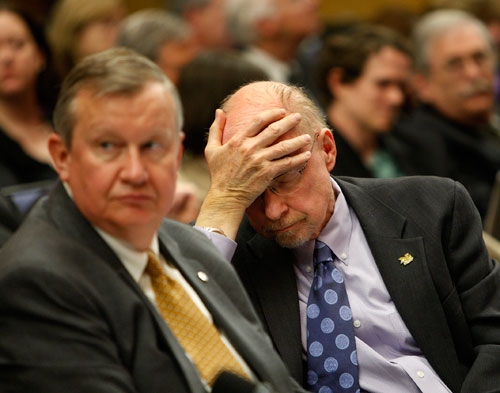Pain of cuts day’s lesson
College and university presidents repeated their tales of woe Thursday to the higher education system's governing Board of Regents as the system deals with another round of budget cuts.
They told of shrinking staffs, trimming courses, forming task forces and committees, and trying to figure out how to cut more from their budgets without harming students, all while planning for what they expect will be more cuts in the future.
"It's going to happen again," said Carol Lucey, president of Western Nevada College.
After cuts in 2007, 2008 and 2009, lawmakers cut the state-supported part of the higher ed system's budget by 6.9 percent this year to deal with an ever expanding shortage of tax revenue.
Already, the presidents told the board, they have offered buyouts, started hiring freezes, cut classes and looked in every nook and cranny they could for extra money.
Now, the two university presidents said, entire programs will have to be eliminated. And with them will go jobs.
"Program eliminations are people eliminations," University of Nevada, Reno, President Milton Glick said. UNR has announced it plans to eliminate one college and several programs.
UNLV President Neal Smatresk said he is forming a committee to look at which programs to eliminate. He said a list of the university's most expensive programs will be a starting point.
The presidents of the state college and the community colleges did not say they would eliminate programs.
Chancellor Dan Klaich said he would try to minimize the effect of the cuts on the campuses by cutting from the system office's central budget first. He created a list of items he and his staff would consider:
■ Closing the University of Nevada Press.
■ Consolidating some business operations, human resources functions, purchasing and police operations.
■ Eliminating some redundant academic offerings.
The regents did not act on the information. The board will hold a special meeting next month on the budget issues.
Several regents said they thought the presidents should be allowed to decide how to cut their budgets once they have a final figure from the board.
"We must trust them, and then we must hold them accountable," Regent Michael Wixom said.
Gov. Jim Gibbons said much the same thing earlier in the day, when he announced before the board several higher education initiatives he said he intends to propose to the Legislature next year.
Among them were allowing the campuses to keep revenue from tuition and fee increases, shifting classified workers from state control to higher ed system control, giving the regents greater autonomy and guaranteeing the higher education system more stable funding.

















